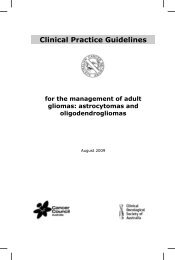Clinical Practice Guidelines for the management of locally advanced ...
Clinical Practice Guidelines for the management of locally advanced ...
Clinical Practice Guidelines for the management of locally advanced ...
Create successful ePaper yourself
Turn your PDF publications into a flip-book with our unique Google optimized e-Paper software.
4.2 Androgen deprivation <strong>the</strong>rapy (early versus delayed)<br />
If radiation <strong>the</strong>rapy is not undertaken following surgery, <strong>the</strong> decision would be whe<strong>the</strong>r to start<br />
hormone treatments due to <strong>the</strong> rising PSA or wait until metastases become evident through scans. The<br />
time to a cancer becoming evident on a scan after a rising PSA is very variable. If <strong>the</strong> PSA is rising<br />
slowly (slow doubling time) and <strong>the</strong> cancer recurred two years following surgery, only 15% <strong>of</strong><br />
patients will have cancer seen on a scan at seven years. If however <strong>the</strong> PSA recurred be<strong>for</strong>e two years<br />
and <strong>the</strong> PSA doubled at a rate <strong>of</strong> less than every 10 months, <strong>the</strong>n 90% <strong>of</strong> patients have disease on a<br />
scan at seven years. 5<br />
There is only one RCT in this scenario 6 and this involved <strong>the</strong> use <strong>of</strong> a 5-alpha reductase inhibitor as a<br />
hormonal manipulation with potency sparing properties. The results were presented in terms <strong>of</strong><br />
change in PSA levels and are <strong>of</strong> no clinical relevance to routine practice.<br />
Evidence summary Level References<br />
There is no level I or II evidence providing guidance <strong>for</strong> any<br />
intervention.<br />
Recommendation<br />
49<br />
Biochemical relapse<br />
II 6<br />
The optimal timing <strong>of</strong> androgen deprivation <strong>the</strong>rapy in patients with biochemical relapse <strong>of</strong><br />
disease without evidence <strong>of</strong> overt metastatic disease is not defined. Eligible patients should<br />
be in<strong>for</strong>med about <strong>the</strong> current TROG Trial<br />
(www.ranzcr.edu.au/affiliatedgroups/trog/healthpr<strong>of</strong>essionals/hptrials/open/TROG_0306.cf)<br />
comparing early versus delayed hormonal <strong>the</strong>rapy in this group.<br />
Grade N/A<br />
See chapter 10 Emerging <strong>the</strong>rapies <strong>for</strong> more on treatments being examined in continuing clinical<br />
trials.<br />
References<br />
1. Horwitz EM, Levy LB, Thames HD, Kupelian PA, Martinez AA, Michalski JM. Biochemical<br />
and clinical significance <strong>of</strong> <strong>the</strong> posttreatment prostate-specific antigen bounce <strong>for</strong> prostate<br />
cancer patients treated with external beam radiation <strong>the</strong>rapy alone: a multiinstitutional pooled<br />
analysis. Cancer 2006;107(7):1496-1502.<br />
2. Crook J, Gillan C, Yeung I, Austen L, McLean M, Lockwood G. PSA kinetics and PSA bounce<br />
following permanent seed prostate brachy<strong>the</strong>rapy. Int J Radiat Oncol Biol Phys 2007;69(2):426-<br />
433.<br />
3. Harman SM, Metter EJ, Tobin JD, Pearson J, Blackman MR. Longitudinal effects <strong>of</strong> aging on<br />
serum total and free testosterone levels in healthy men. Baltimore Longitudinal Study <strong>of</strong> Aging.<br />
J Clin Endocrinol Metab 2001;86(2):724-731.<br />
4. Stephenson AJ, Scardino PT, Kattan MW et al. Predicting <strong>the</strong> outcome <strong>of</strong> salvage radiation<br />
<strong>the</strong>rapy <strong>for</strong> recurrent prostate cancer after radical prostatectomy. J Clin Oncol<br />
2007;25(15):2035-2041.<br />
5. Pound CR, Partin AW, Eisenberger MA, Chan DW, Pearson JD, Walsh PC. Natural history <strong>of</strong><br />
progression after PSA elevation following radical prostatectomy. JAMA 1999;281(17):1591-<br />
1597.<br />
6. Andriole G, Lieber M, Smith J et al. Treatment with finasteride following radical prostatectomy<br />
<strong>for</strong> prostate cancer. Urology 1995;45(3):491-7.



